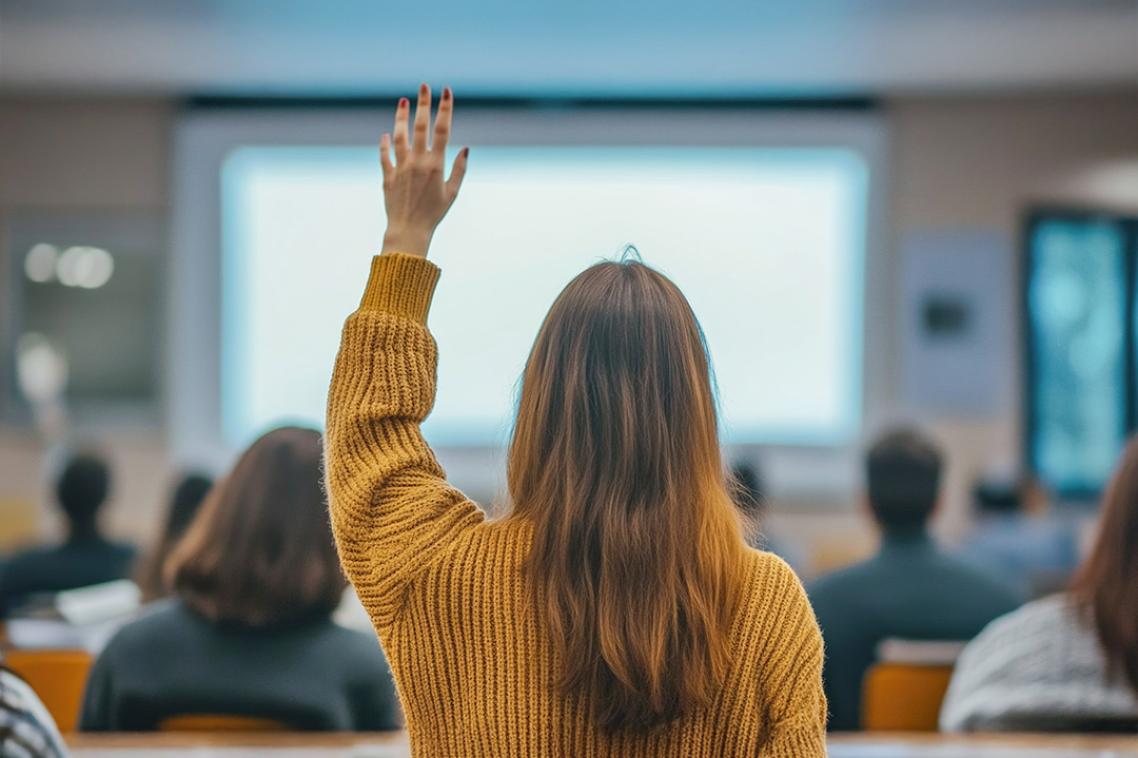
Dialogues Across Difference
In a shared effort to strengthen understanding, respect and cohesion across our UQ community, we have developed the campus culture speaker series 'Dialogues Across Difference'.
The series has been created in partnership with students and staff and aims to create a space for diverse perspectives and thoughtful dialogue, all within a respectful and inclusive environment.
With 4 events this semester, ‘Dialogues Across Difference’ brings together leading experts and voices from across campus life to engage in meaningful conversation, explore different ideas, and challenge our assumptions. The series includes a mixture of individual talks, panel discussions, and audience participation.
To extend the conversation, podcasts will be made available following the on-campus events.
Upcoming events

The aesthetics of power: Why authoritarianism needs spectacle
Join journalist and author M. Gessen, along with Waleed Aly and Scott Stephens, as they examine the nature and necessity of this ‘aesthetics of strength’ — and what it does to the underlying conditions of democratic life. Please note that this event is part of a live edition of ABC Radio National's The Minefield and photography and audio recording will occur throughout the session.
Event details
Dates: Tuesday 10 March, 2–3pm
Venue: Customs House, Long Room, 399 Queen St, Brisbane City
Cost: This is a free event
Who can attend: UQ students, staff and alumni
Register to attend The aesthetics of power
Speakers
Waleed Aly: Waleed Aly is an award‑winning Australian broadcaster, journalist, academic, and lawyer. He is the co‑host, with Scott Stephens, of The Minefield on ABC Radio National, and was for ten years the co‑host of Network 10’s The Project. A lecturer in politics at Monash University, Waleed specialises in global terrorism and political theory.
Scott Stephens: Scott Stephens, ABC’s Religion & Ethics editor and co‑host of The Minefield, writes on moral philosophy, literature and democracy. He co‑authored Uncivil Wars with Waleed Aly and has edited works by Raimond Gaita and Slavoj Žižek. His forthcoming book is The Demand of Decency.
M.Gessen: M. Gessen, a Russian‑American journalist, author and activist, writes powerfully on authoritarianism, human rights and LGBTQ+ issues. A New Yorker staff writer and former New York Times columnist, they are the award‑winning author of The Future Is History and Surviving Autocracy, and a Distinguished Professor of journalism in New York.

Building peace in a divided world
This event marks the UN International Day for the Elimination of Racial Discrimination. Bishop Daniel Abot will share personal experiences of racism and the challenges faced by migrant and refugee communities, offering insights on healing and belonging. The talk will be followed by afternoon tea and community conversation.
Event details
Date: Friday 20 March, 1–3pm
Venue: Terrace Room, Level 6, Sir Llew Edward Building, UQ St Lucia campus
Cost: This is a free event
Who can attend: UQ students, staff and alumni
Register to attend Building peace in a divided world
Speakers
Moderator: Professor Heather Zwicker, Pro Vice-Chancellor (Campus, Culture and Leadership)
Bishop Daniel Abot: Bishop Daniel Abot, an Anglican bishop in Toowoomba, is a respected advocate for peace and cultural understanding. Born in South Sudan, his experiences of conflict shape his work with migrant communities, supporting families and youth while promoting reconciliation, social cohesion, and hope in multicultural Australia through community engagement initiatives today.

Human rights and international justice in a fractured world
Amid rising conflict, displacement, and democratic decline, this event asks what the future of human rights looks like. Dr Simon Adams, a leading advocate for atrocity prevention, will explore evolving human rights norms, the pressures on international justice, and Australia’s diplomatic role, drawing on decades of work in global conflict zones.
Date: Thursday 26 March, 1–3pm
Venue: Terrace Room, Level 6, Sir Llew Edwards Building, UQ St Lucia campus
Cost: This is a free event
Who can attend: UQ students, staff and alumni
Register to attend Human rights and international justice in a fractured world
Speaker
Dr Simon Adams: Dr Simon Adams, Professor of Human Rights at Murdoch University, is a leading global voice on atrocity prevention and international justice. Former CEO of the Center for Victims of Torture and longtime UN advocate, he has worked in conflict zones worldwide and authored five books, frequently commenting in major international media.

Skills for dialogue – UNESCO World Day for Cultural Diversity for Dialogue and Development
Join us for a skills‑based workshop marking UNESCO’s World Day for Cultural Diversity. Led by Professor Elissa Foster, this session builds practical capabilities for engaging in respectful, constructive dialogue across differences. Participants will learn evidence‑informed communication strategies and leave with tools to strengthen connection in study, workplace, and community settings.
Date: Thursday 21 May, 1–3pm
Venue: Coming soon
Cost: This is a free event
Who can attend: UQ students, staff and alumni
Registration: Coming soon
Speaker
Professor Elissa Foster: Professor Elissa Foster, a tenured communication scholar at DePaul University, specialises in interpersonal, family, and health communication. Author of Communicating at the End of Life, she has published widely and held key leadership roles. Her work centres on narrative inquiry and person‑centred communication, earning recognition for her thoughtful, student‑focused approach.
Podcasts

Why is it so hard to talk?
Over the past decade, having respectful conversations and debate, especially about the big issues, has become more challenging. We live in a world where trust is declining, information is non-stop and algorithms are feeding us more of what we already believe. We explore how we can have better, more respectful conversations and debate – even when we don’t agree.
Listen to Why is it so hard to talk?
Speakers
Narrator: Professor Heather Zwicker, Pro Vice-Chancellor (Campus, Culture and Leadership).
Professor Matthew Hornsey
Perspective: Declining trust in science
Matthew's research focuses on why people reject scientific and technological evidence, and what makes it so hard to have constructive conversations about these issues. He examines the psychological forces that drive or block pro-environmental action, and how group dynamics and polarisation can deepen divides.
Dr Jackie Huggins AM FAHA
Perspective: Truth, trust and healing
Jackie is an Aboriginal Australian author, historian, academic and advocate for Indigenous rights. Professor Huggins is a long advocate for Reconciliation and is an historian and author who has spent more than four decades working across all spheres for social justice, recognition and all issues surrounding Indigenous Australians.
Dr Bethany Mackay
Perspective: Polarisation and safety
Beth is a clinical psychologist and a leader in student wellbeing and mental health services in the Australian higher education sector. She is UQ’s Director, Student Support and Wellbeing Services overseeing proactive engagement, education, safety, wellbeing, diversity and inclusion initiatives as well as counselling and mental health response services.

The fraught context
This podcast unpacks the complexities of modern debate, examining the factors that make discussions challenging. It looks at the current socio-political environment as a catalyst for disagreement, emotional intensity, and how misinformation and polarisation is contributing to fraught conversations.
Speakers
Narrator: Professor Heather Zwicker, Pro Vice-Chancellor (Campus, Culture and Leadership).
Dr Anne Kruger
Perspective: Misinformation and disinformation
Anne is a leading expert in digital research and practice, empowering external media organisations and communications stakeholders to address misinformation. Anne was a contributor to Australia's first misinformation and disinformation regulatory code of practice.
Dr Kiri Ingram
Perspective: Online radicalisation
Kiri is a Lecturer in the School of Political Science and International Studies. Her research focuses on the intersection of gender and international politics, particularly in the context of extremist movements and peacebuilding.
Professor Andrew Phillips
Perspective: Social media
Andrew is a Professor in the School of Political Science and International Studies. His research focuses on war, strategy and international order, with a particular focus on Great Power rivalry and asymmetric violence as drivers of transformative change in world politics.
Shahzaib Farhan
Perspective: Students’ lived experiences - social media and young adults
Shahzaib is a current UQ student studying Law and Political Science and is one of the 26 UQ Union Councillors.

Tools for civil discourse
In this podcast, speakers share practical tools for having respectful and inclusive debates. They discuss how to actively listen, understand different perspectives, challenge ideas (not people), and practice empathy—so everyone feels heard and valued.
Listen to Tools for civil discourse
Speakers
Narrator: Professor Heather Zwicker, Pro Vice-Chancellor (Campus, Culture and Leadership).
Associate Professor Morgan Brigg
Perspective: Tools from mediation
Morgan is a political scientist focusing on cultural difference in peace and conflict, and also researches and publishes in international relations, law and dispute resolution, Indigenous politics, governance and public policy and international development. He is a qualified mediator.
Professor Thelma Parker
Perspective: Tools for collaboration
Thelma is the Associate Dean (Indigenous Engagement) in the Faculty of Health, Medicine and Behavioural Science. A proud Waluwarra Wangkayujuru Wangkaymunha woman, she has more than 25 years’ experience in education, employment and training along with deep knowledge of state and national priorities.
